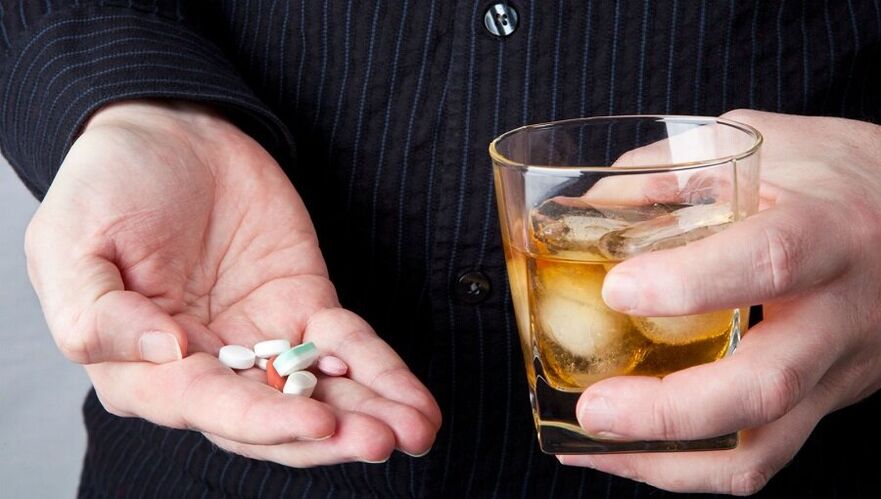Everyone knows that combining alcohol and antibiotics is impossible, but few people know when you can drink alcohol after taking antibiotics. It is not clear how many days to expect after the last pill. Many others are wondering what happens if you skip a few glasses during treatment or immediately after treatment ends. With these questions we will try to figure it out, initially you will need to familiarize yourself with the effects of alcohol and antibiotics on the body.

Treatment and contraindications for alcohol
Antibiotics are not only very effective drugs but also very dangerous. Their admission must necessarily be agreed with the attending physician. The main sign of the need to use them is the presence of a bacterial infection, which the body cannot cope with on its own.
If a specialist has prescribed antibiotics, then during treatment you should adhere to a number of rules:
- Strictly following the time and time of taking the drug, will maintain a stable concentration of some substances in the blood.
- The duration of taking the drug should be determined by the doctor. Usually the course does not exceed 2 weeks, and some drugs are enough for 3 days.
- Antibiotics should be taken with clean water without gas.
- During the treatment period, you should adhere to a reasonable diet. From the diet you need to exclude fatty foods and, of course, drink alcohol, even in small amounts.
The last rule needs special attention, especially not to drink alcohol. Furthermore, do not drink alcohol immediately and after a course of treatment for a specific period of time. But why shouldn't alcohol be consumed after antibiotic treatment? When ethanol and its constituents enter the body, they break down into small particles, transforming into simple compounds. And some of the alcohol's molecules will start to overlap with the drug's molecules, which can cause serious problems in the body.
It has been proven many times that after drinking alcohol, the effectiveness of antibacterial drugs is significantly reduced. Moreover, such a mixture will create a large load on the liver, which has an adverse reaction not only to the work of this organ, but also to the condition of the body as a whole. Drinking alcohol after taking antibiotics or during treatment can cause unpredictable reactions to systems and organs.
Possible consequences
As already noted, drinking alcohol together or immediately after taking antibacterial drugs affects the whole body, not limited to individual areas, which is why the consequences cannot be foreseen. However, the most common are the following:
- If you drink alcohol in the presence of antibiotics in your body, a sharp allergic reaction may appear.
- One big danger when you take the drug is the worsening of the drunkenness and the feeling of hangover. After that, the usual intake can lead to loss of control. At the same time, there is a risk of mental distortion.
- Alcohol after taking antibiotics significantly reduces the therapeutic effect of the drug, which may lead to the need to repeat the course or increase the dose of the drug, which also adversely affects the body. In addition, increasing the dose of drugs will help reduce their effects in the future, and thus the adaptation of the infection to the drug. Infections with weakening of antibiotics have time to become stronger and become resistant. Therefore, after a course of antibiotics, the infection will reappear over time and stronger drugs will be needed to clear it up.
- In addition, possible consequences include traditional symptoms such as headache, nausea, blurred vision, liver damage and dizziness.
All of the above consequences can be avoided if you know when you can drink alcohol after taking antibiotics.
What deadlines do you need to adhere to?
There are no exact statements about how long after taking antibiotics it is safe to drink alcohol. For each antibacterial drug, it is determined individually how many days after treatment you can drink alcohol, and this must be determined by the doctor. As a rule, this period is at least 10 days. This is the minimum time it takes for a person's kidneys and liver to return to normal, and the intestinal microflora to be restored. However, these are general recommendations, it all depends on the characteristics of the organism.
If the patient has chronic liver and kidney disease, the time after how long can drink alcohol is slightly increased. And to avoid mistakes, it is better to consult a specialist on this matter. After the treatment process, do not drink alcoholic beverages for as long as possible for the body. After all, alcohol and such do not bring anything useful to the body, and even more so in the period of weakness of the body.
Today, the main contraindications have been studied about whether it is possible to drink alcohol during antibiotic therapy, as well as the general provisions regarding abstinence from alcohol that should be observed.
Obeying these recommendations and rules, it will not only quickly heal with the help of antibiotics, but will also not harm the body. But it is important to remember that taking antibiotics without a doctor's prescription is also prohibited.


























